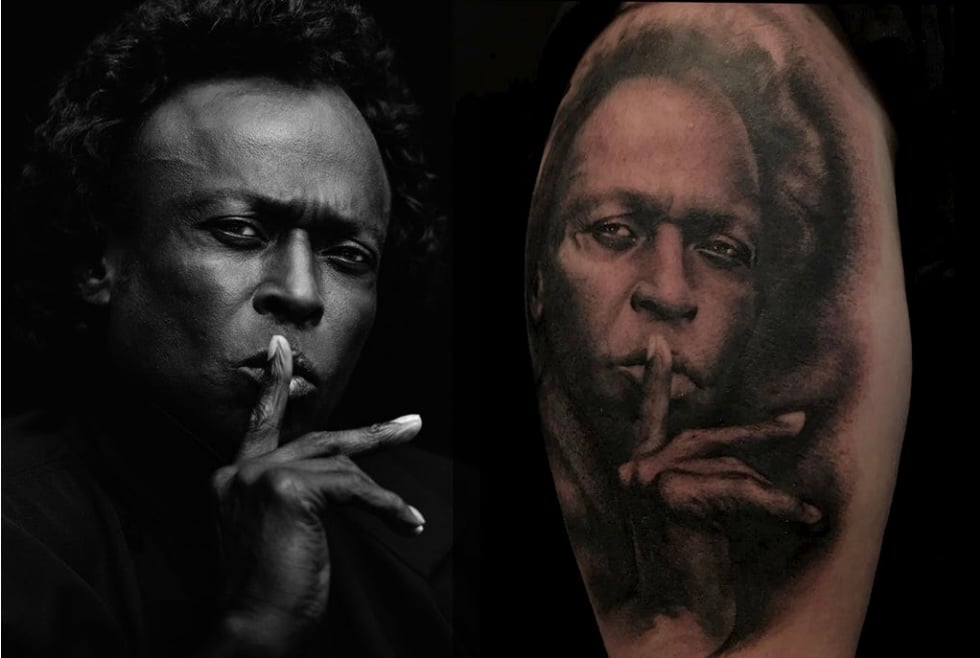LOS ANGELES (CN) — Celebrity tattoo artist Kat Von D said she never obtained a license for any of the thousands of tattoos she inked based on photos as she took the stand Wednesday in the copyright trial brought by a photographer for her unlicensed use of his 1989 photo of Miles Davis.
"I'm literally tattooing my friend with a portrait of his favorite trumpet player," Von D, whose full name is Katherine Von Drachenberg, told the jury. "I consider this fan art."
The artist, under questioning by Jeff Sedlik's attorney Robert Allen, contrasted her use of Sedlik's photo for the tattoo — for which she received no payment — with corporations who take advantage of artists by not compensating them for the use of their work for commercial ends.
According to Von D, who owned the High Voltage Tattoo shop in Hollywood until she had to close it because of Covid-19 lockdown, no tattoo artist obtains a license to use a photo they base their creation on, and many photographers are honored when they learn that someone liked their work so much that they wanted to have it permanently inked on their body.
Von D rose to fame through her appearances on the reality TV shows Miami Ink and LA Ink, the latter of which was shot at her High Voltage location. Now a stay-at-home mom, Von D said she hasn't charged anyone for a tattoo in over a decade and only has done work for friends for free.
"I don't charge for tattoos because it's my gift to give," she testified.
One friend who was lucky enough to get a tattoo by Von D was Blake Farmer, a lighting technician who worked on some shoots for Von D's makeup business in 2017. After talking with Farmer, who plays trumpet himself, and learning how important Miles Davis was to him, she offered to create a tattoo of the jazz legend.
Farmer, who testified earlier Wednesday at the trial in downtown Los Angeles, forwarded a photo of the cover of Davis's "Bitches Brew" and a black and white photo he said he found on Google with Davis raising his index finger to his mouth in shush gesture.
Farmer showed the jurors the large tattoo on his right shoulder following his brief testimony. He said the photo was his idea and that he didn't pay for the tattoo but gave a suggested tip to the shop manager at High Voltage who helped prepare the session.
Unfortunately for Von D, the photographer whose picture they used turned out to be well-versed in copyright issues and on occasion scans the internet for unlicensed use of his work. Sedlik discovered in 2018 that Von D had used his photo and had posted on her social media about the tattoo, including photos of the work in process.
Von D maintains that her use of the photo is fair use under copyright law because rather than simply copying the image she created something new and unique by her interpretation of Davis's portrait. She cited her shading and the smoke and negative space, which was also inspired by the "Bitches Brew" cover art, as factors that made her rendition different from Sedlik's photo.
"I'm not copy machine," she said. "I always make changes and adjustments. I try to capture the sentiment of the people getting tattooed."
Under questioning by her attorney Allen Grodsky, Von D said that she had never received anything like the email she got from Sedlik informing her that she was using his work without permission or that she ever got sued.
Sedlik testified yesterday how in 2014 he had tracked down another tattoo artist who had used his Miles Davis portrait as a reference for a tattoo. That individual, who according to Sedlik had only 3 social media followers, was granted a retroactive license from the photographer who waived the $5,000 licensing fee as a professional courtesy after this artist had shown contrition and apologized.
Under cross-examination by Grodsky, Sedlik testified earlier Wednesday that he didn't believe he had threatened this artist with a lawsuit or told him that he could face $150,000 in statutory damages for infringing his copyright.
"My intent was to walk him through the process of obtaining a license," Sedlik told the jury. "I was trying to help someone understand copyright."
Subscribe to Closing Arguments
Sign up for new weekly newsletter Closing Arguments to get the latest about ongoing trials, major litigation and hot cases and rulings in courthouses around the U.S. and the world.









